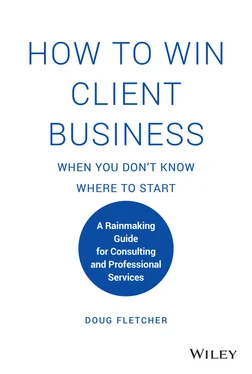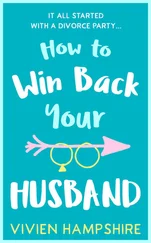When you've done your homework, and you have identified an organization or an individual who you would like to serve, your best option whenever possible is a warm introduction from a mutual friend. But sometimes we simply don't know anyone who can introduce us. In these cases, cold prospecting may be our only option.
Ask anyone who cold prospects for a living and they'll readily admit that it's hard work, and you'll strike out much more often than you'll score. You have to develop thick skin and get used to a lot of rejection. The key is to find common ground with your targeted prospect, something you have in common that serves as a proxy for an introduction from a mutual friend.
These seven client pathways represent the most common ways in which we land our client business. Each client journey may be as unique as a snowflake, but they often share many similarities.
Hopefully you're beginning to connect the dots between the client's buying decision journey and the five rainmaker skills. Laying this foundation of consumer behavior and human psychology helps to better understand why the rainmaker skills are so effective.
Now that we're armed with an understanding of how clients buy and where clients come from , it's time to roll up our sleeves and learn the five rainmaker skills. Before we do, there's one last topic we need to discuss. This is the last thing we need to cover before learning the rainmaker skills – I promise.
What if we don't want to sell our services? What if we self‐identify as an introvert? Aren't all rainmakers highly sociable extroverts? The short answer is no. My experiences and those of many other highly skilled rainmakers indicate that there are many ways to win client business; unique approaches tailored to our own strengths and preferences. Let's squash this myth of the extroverted rainmaker before we go any further. If we're to become successful at winning client business, we have to first understand that there is no one right way .
1 Molly from Edward Jones story: Inspired by real characters known by the author.
2 The Seven Most Common Client Pathways: Survey conducted by Fletcher & Company, LLC, 2020. https://www.fletcherandcompany.net/new-client-pathways-survey-findings/.
3 Paddy Fleming story: Interview by How to Win Client Business research team, 2020.
4 Chuck McDonald story: Interview by How to Win Client Business research team, 2020.
5 Sarah and Richard story: Inspired by real characters known by the author. Names and locations have been changed.
6 Mark story: Inspired by real characters known by the author. Names and locations have been changed.
CHAPTER 4 Rainmaking for Introverts and People Who Don't Want to Sell: Winning Client Business While Being True to Yourself
At its core, the idea of purpose is that what we do matters to people other than ourselves.
—Angela Duckworth, author, Grit: The Power of Passion and Perseverance
Carl Jung, the father of modern personality theory, first introduced the world to the concept of introversion and extroversion in his 1921 classic Psychological Types . According to Jung:
Introverts are drawn to the inner world of thought and feeling, extroverts to the external life of people and activities.
If we accept the premise that we have to become rainmakers if we are to become partner – or for our solo practice to thrive – this creates an interesting conundrum for a big swath of us. Marketing ourselves is viewed as the realm of the outgoing, the charismatic, those with the gift of gab. There's a reason why we think this way. And to understand why, we need to go back over 100 years.
According to cultural historian Warren Susman, Jung's theories spawned a shift in early twentieth‐century American societal values away from a Culture of Character to a Culture of Personality. In the Culture of Character of the 1800s, the ideal self was serious, disciplined, and honorable. In the emerging Culture of Personality of the twentieth century, Americans became captivated by those who were bold and entertaining.
This shift in American thinking is exemplified by the success of Dale Carnegie. Born into humble beginnings in rural Missouri in 1902, Dale went on to become a best‐selling author and leader of the emerging American belief that the world is ruled by extroverts. According to Susman:
Carnegie's metamorphosis from farmboy to salesman to public‐speaking icon is also the story of the rise of the Extroverted Ideal. Carnegie's journey reflected a cultural evolution that reached a tipping point around the turn of the twentieth century, changing forever who we are and whom we admire, how we act at job interviews and what we look for in an employee, how we court our mates and raise our children.
America's societal views on extroversion and introversion are evolving; the pendulum is swinging to a more balanced perspective. Susan Cain, a leading twenty‐first‐century researcher on introversion, offers this perspective in her wonderful book Quiet: The Power of Introverts in a World That Can't Stop Talking :
We make a grave mistake to embrace the Extrovert Ideal so unthinkingly. Some of our greatest ideas, art and inventions – from the theory of evolution to van Gogh's sunflowers to the personal computer – came from quiet cerebral people who knew how to tune in to their inner worlds and the treasures to be found there.
Furthermore, according to Cain, one‐third to one‐half of Americans lean toward introversion – in other words, one out of every two or three people you know. If these statistics surprise you, that's probably because so many people pretend to be extroverts. Cain's research suggests that closet introverts pass undetected in the corridors of corporate America.
I suspect that a healthy percentage of us in the professional services tilt toward introversion. By nature, many professionals are cerebral, inward‐focused problem‐solvers. We live inside of our heads much of the time. We draw energy by wrestling with thorny issues for hours, days, or weeks on end. Many of you may relate to what I'm talking about.
You may be thinking to yourself, “Wait, I don't want to be a salesperson!” If so, I'm confident you're in good company. Don't panic; we don't have to be salespeople at all. Or fake extroverts. The key is to view our work as rainmakers as helping others; to see the process of client development as a journey in helping identify and find solutions to client problems.
Mindset Shift One: Seeing ourselves as problem‐solvers instead of salespeople
Some may see the distinction between calling us problem‐solvers versus salespeople as purely semantics. It is far more than this. It is a total mindset shift in the way we view the work we do as rainmakers. It's important to see our role as partners in a journey of helping solve important problems rather than selling services. Products may be sold by salespeople, but clients hire trusted advisors.
Tim Nath is the operations practice director of Aspirant. Aspirant is a Pittsburgh‐based management consulting firm with approximately 100 employees. Like many of the senior professionals at Aspirant, Tim comes from an operating background. Tim shared with me that when he first entered consulting he was uncomfortable with selling:
If I could go back in time, I would like to know that rather than going into a client with “Here's what I can sell,” it is really about “What problems do you have that I can help solve?” I'm an introvert by nature. It always rubbed me the wrong way to think about being in a “sales position.” But when I think about it as “I'm helping someone solve an important problem” – that's something that I can get on board with.
Читать дальше












